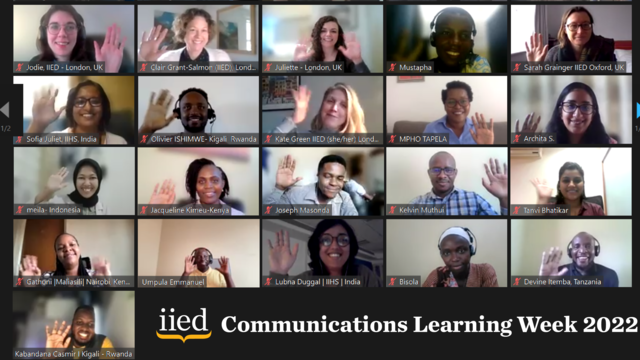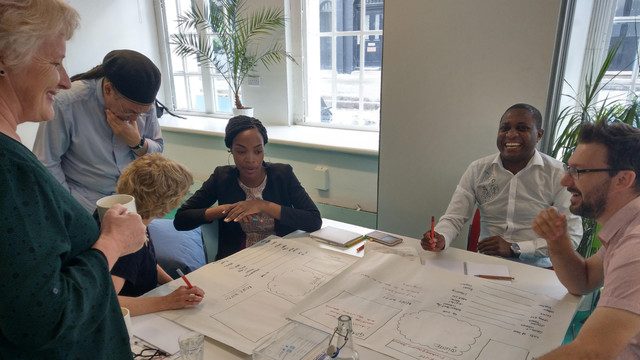Twitter, visas and communication strategies
Rosalind Goodrich says the challenges of getting UK visas for visitors attending IIED's Communications Learning Week struck a chord with Twitter users – and helped inform the workshop discussions on communication strategies.


In the 'audience personas' session, we worked together to drill down into the detail of who our audiences are, their goals and what they need from us as communicators (Photo: Anne Schulthess/IIED)
A few weeks ago I watched my Twitter account expectantly. A big milestone was approaching – big for me at least – the 500 followers moment.
I began to wonder what kind of tweets attract people to click ‘follow’? I’ve seen colleagues start on Twitter later than me and rapidly rise up the ranks. Was it who they were or what they said? Or a bit of both? I know I’m infrequent with my posts, but when there’s something substantive to talk about, I’m there.
Time passed and I got an answer to my question.
Every year I organise the IIED Communications Learning Week. It’s a point when we bring communicators from our partner organisations to London for four days of shared learning. This year we were hoping for 11 participants – the biggest number for several years. As the weeks went by, however, we heard first one participant, then another, then another, had been refused a visa to come to the UK.
Altogether four potential participants were refused, with two more left waiting to hear until the day the course started – too late for them to make the journey.
The reasons were various and at odds with each other: "too much money in your bank account", "not enough money in your bank account", "we can’t see how you will benefit from this course". Disheartening, but reflecting similar experiences of other organisations.
I tweeted about our situation – and got 29 likes and 16 retweets plus… some more followers.
Exactly @iied experience w upcoming learning event. 2 Uganda partners refused: 'no family so assume will not go home & cant see how you wld benefit'. We wld have benefited enormously! Disgraceful & insulting to people who are specialists in their field --> https://t.co/GxashP3oAP
— Rosalind Goodrich (@RosGoodrich) June 9, 2019
I’d commented on something topical – the front page story of a national newspaper – that resonated widely, and as a result got way more engagement than normal.
Challenges and opportunities
Fast forward to the last week in June, and the five Communications Learning Week participants who had managed to overcome the apparent hostile UK Home Office approach, were telling us about the challenges and opportunities they face in their work.
My Twitter concerns paled into insignificance.
We heard about legislation effectively shutting down comments on social media and creating an atmosphere of caution, with people reluctant to say anything remotely critical about the government. Of funding being reduced and powerful elites manipulating the media away from grassroots demands for change and towards the issues they wanted to highlight.
We heard inspiring stories too, of power swelling upwards from local communities to district and national level; of women using communications effectively to profile their voice on land rights, gaining confidence in the process and being ready now to acquire title deeds and land certificates.
But as we talked about what makes a strong communication strategy, more than once participants mentioned the phrase ‘the politics of knowledge’ and noted that it was essential to do a thorough political analysis of the context in which the strategy would operate.
We always recommend a situation analysis as a starting point, but a PEST analysis (assessing the political, economic, social and technological forces at play) seems to be becoming increasingly important.
A moment for mutual learning
The IIED Communications Learning Week is a moment for mutual learning. We all learn from each other and this year was no exception. With the new IIED strategy in mind and our own associated Communications Group objectives, I realised that I was already getting ideas for how we might approach working on one of them – our desire to have a more in-depth knowledge of the countries in which IIED works.
Alongside a comprehensive assessment of the media and communication landscape, we would have to include an analysis of the political and legislative situation in each country. After that, we should check in with our communication partners – some of them with us in London – to see if what we had put together was right.
Fun times too
I started all this with a trivial Twitter matter and seem to have ended up on rather a serious note. The world does seem to be serious right now, but despite that, we had fun at Comms Learning Week too.
We made spontaneous two-minute videos of each other and then critiqued them a few days later (constructively of course) – short videos are another way of increasing engagement on Twitter.
Last session of the day at #clw2019 where everyone is practising making short videos with clear information and calls to action. We'll watch and critique them later in the week. A great end to a great day of communications learning and sharing. pic.twitter.com/lWdOMUzjep
— IIED (@IIED) June 25, 2019
Final day of #clw2019 at IIED and we're having a great morning watching and analysing the videos we filmed earlier in the week. pic.twitter.com/Y1VATLhHEB
— IIED (@IIED) June 27, 2019
An evening walk on Hampstead Heath hearing about its conservation strategy ended with a hearty picnic; the next evening found us walking to Buckingham Palace via the Houses of Parliament – all shared, of course, on social media.

Let’s hope we can get back to the days when all the people who want to join us for this invaluable four days can do so with no concern about visas.
A poor situation may have got me over the 500-follower mark, but I’d trade that any day for seeing my communication counterparts in London: listening, learning and sharing what we know is so much better in person.



